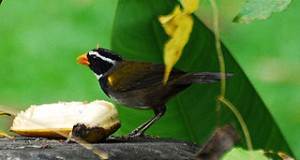 The chipper little zebra finch, ever popular in the lab and home, has once again shed some light on topics important to those who study both birds and people.
The chipper little zebra finch, ever popular in the lab and home, has once again shed some light on topics important to those who study both birds and people.
Hearing and Correcting the Song
Researchers at Switzerland’s Zurich University have shown that certain cells in zebra finch brains become active when the bird makes a mistake in its song, or when a disruption is introduced into a recording of another’s song. This offers the first proof that birds listen to their own songs, and compare what they hear to an “ideal” song that is stored somewhere in the brain.
Implications for People
Human language skills are thought to develop in a similar manner, but the functioning of the neurons involved is largely unknown. The recent discoveries concerning finches may point the way towards a better understanding of speech development in people.
Song and Speech Timing
In related experiments, it was discovered that a specific area of the brain, the High Vocal Center, controls the timing of zebra finch singing. Cooling this area of the brain slowed the song’s tempo, but did not affect the sequence of the notes (one is tempted to wonder why the birds kept singing while their brains were being chilled!).
Birdsong and human speech both require a complex series of timing adjustments if they are to be understood by others of their species. The Zurich researchers are hopeful that their work will have implications for those studying human speech impediments.
The zebra finch is one of the world’s most important laboratory animals, and studies of it have led to a staggering array of important discoveries. An interesting summary of its many contributions is posted at:
http://genome.wustl.edu/genome.cgi?GENOME=Taeniopygia%20guttata
 That Bird Blog – Bird Care and History for Pet Birds
That Bird Blog – Bird Care and History for Pet Birds


